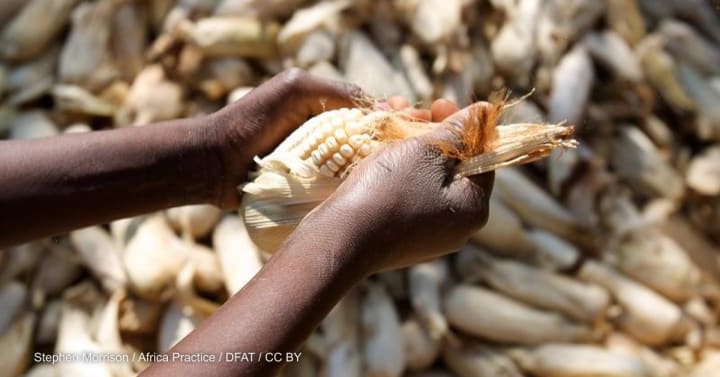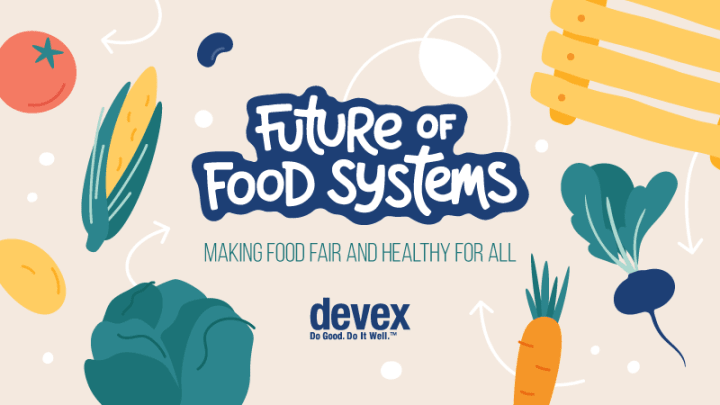
With preparations for the United Nations’ upcoming Food Systems Summit in full swing, recent proposals for a new science-policy platform have attracted attention and controversy. The summit’s scientific group, headed by one of the proponents of the idea, has suggested the creation of a new science-policy body for food security and nutrition — akin to the Intergovernmental Panel on Climate Change — as a potential “game changer.” The European Commission is also studying the idea.
While the summit is an opportunity to strengthen food systems governance structures, and it may sound like a great idea to create a high-profile, IPCC-like group, such proposals overlook the fact that there already is a strong body playing that very role: the High Level Panel of Experts on Food Security and Nutrition, or HLPE. This panel serves as the scientific advisory body to the Committee on World Food Security, or CFS, the United Nations’ unique policy-coordinating body for addressing food security and nutrition.
On behalf of CFS and HLPE, we believe that more can be gained by strengthening the existing science-policy interface than trying to reinvent the wheel.
The origins of HLPE date back to 2009, when CFS underwent reform that made it the foremost legitimate and inclusive body for coordinating food security and nutrition policies. This reform addressed the lack of an effective global institutional architecture to deal with a world food crisis and to achieve goals on eliminating hunger and malnutrition. HLPE was established to contribute to this effort by providing evidence-based scientific research to inform the committee’s development of policy guidance.
Creating a new science-policy interface in the context of the Food Systems Summit would mean further fragmentation and duplication of international food policy governance.
—HLPE has the key attributes needed by any science-policy interface body to gain the trust of policymakers and the wider public. It provides high-quality, independent, and impartial scientific expertise that serves policymakers’ needs. It holds a high degree of legitimacy with its constituents — including governments, civil society, the private sector, and U.N. agencies — based on its inclusive procedures, such as seeking inputs from different disciplines, knowledge bases, experiences, and perspectives to inform its work.
Its reports and issues papers serve as the basis for high-profile policy recommendations, which are adopted by CFS and then implemented by governments and other CFS stakeholders. And HLPE members, as well as project teams, are selected in an open nomination process that is rigorous and based on scientific excellence.
Given HLPE’s strengths and potential, it is puzzling that some advocates of creating a new scientific body for food security say there is no institution currently serving in the role of interface between science and policy with respect to food systems. Such claims are misleading.
While it is appreciated that Food Systems Summit organizers have openly stated that the U.N. secretary-general envisions no new institutions being created as a result of the summit, this raises the question of why a separate scientific group was created for it in the first place — a group that has largely ignored HLPE in its deliberations.
We recognize that HLPE must also innovate to remain nimble and continue to provide high-quality scientific advice to deal with the constantly evolving challenge of food security and nutrition.
Get development's most important headlines in your inbox every day.
Thanks for subscribing!
To enable the panel to offer up-to-date and science-based policy advice, we encourage CFS to grant more latitude to HLPE to initiate its own reports in response to rapidly changing global conditions, as it did with a recent issues paper about COVID-19’s impact on food security and nutrition, as well as a report on the urgent transformative changes needed in food systems to end hunger and malnutrition and to promote sustainable agriculture.
HLPE also seeks to develop ideas for better data collection and analysis for monitoring, forecasting, and modeling to enable itself and its partners to track evolving food system trends with more precision, which will be the focus of an upcoming report on data systems.
Part of our The Future of Food Systems series
Find out how we can make food fair and healthy for all. Join the conversation using the hashtag #FoodSystems and visit our The Future of Food Systems page for more coverage.
In its first decade, HLPE delivered high impact at low cost, with a budget limited by the fact that only a few CFS member governments committed funds to its work. Now is the time for more governments to step up and provide more reliable funding to help improve the panel and its work, enabling HLPE to expand its activities and areas of expertise.
The upcoming Food Systems Summit comes at a crucial time when hunger is rising, a pandemic is raging, and a changing climate is threatening food systems. In this context, there is a strong argument for building on and strengthening CFS and HLPE as its scientific advisory body to take up the summit’s recommendations and to monitor progress on food security and nutrition policy going forward.
Creating a new science-policy interface in the context of the Food Systems Summit would mean further fragmentation and duplication of international food policy governance — exactly what is not needed at this critical juncture.
Visit the Future of Food Systems series for more coverage on food and nutrition — and importantly, how we can make food fair and healthy for all. You can join the conversation using the hashtag #FoodSystems.

Printing articles to share with others is a breach of our terms and conditions and copyright policy. Please use the sharing options on the left side of the article. Devex Pro subscribers may share up to 10 articles per month using the Pro share tool ( ).
The Link LonkMay 22, 2021 at 06:16AM
https://www.devex.com/news/opinion-why-reinvent-the-wheel-on-food-security-and-nutrition-99929
Opinion: Why reinvent the wheel on food security and nutrition? - Devex
https://news.google.com/search?q=Wheel&hl=en-US&gl=US&ceid=US:en

No comments:
Post a Comment